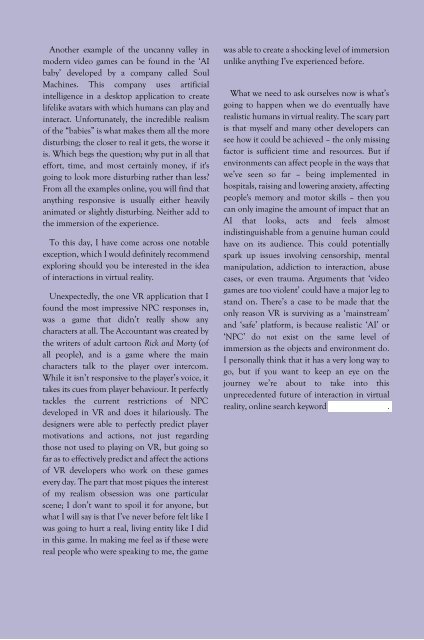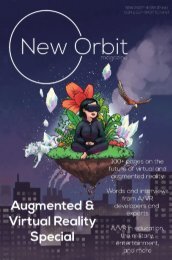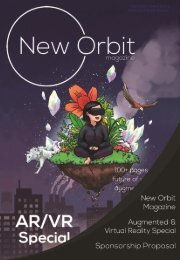Feb 2018 v01 online
((Incomplete formatting))
((Incomplete formatting))
You also want an ePaper? Increase the reach of your titles
YUMPU automatically turns print PDFs into web optimized ePapers that Google loves.
Another example of the uncanny valley in<br />
modern video games can be found in the ‘AI<br />
baby’ developed by a company called Soul<br />
Machines. This company uses artificial<br />
intelligence in a desktop application to create<br />
lifelike avatars with which humans can play and<br />
interact. Unfortunately, the incredible realism<br />
of the “babies” is what makes them all the more<br />
disturbing; the closer to real it gets, the worse it<br />
is. Which begs the question; why put in all that<br />
effort, time, and most certainly money, if it's<br />
going to look more disturbing rather than less?<br />
From all the examples <strong>online</strong>, you will find that<br />
anything responsive is usually either heavily<br />
animated or slightly disturbing. Neither add to<br />
the immersion of the experience.<br />
To this day, I have come across one notable<br />
exception, which I would definitely recommend<br />
exploring should you be interested in the idea<br />
of interactions in virtual reality.<br />
Unexpectedly, the one VR application that I<br />
found the most impressive NPC responses in,<br />
was a game that didn’t really show any<br />
characters at all. The Accountant was created by<br />
the writers of adult cartoon Rick and Morty (of<br />
all people), and is a game where the main<br />
characters talk to the player over intercom.<br />
While it isn’t responsive to the player’s voice, it<br />
takes its cues from player behaviour. It perfectly<br />
tackles the current restrictions of NPC<br />
developed in VR and does it hilariously. The<br />
designers were able to perfectly predict player<br />
motivations and actions, not just regarding<br />
those not used to playing on VR, but going so<br />
far as to effectively predict and affect the actions<br />
of VR developers who work on these games<br />
every day. The part that most piques the interest<br />
of my realism obsession was one particular<br />
scene; I don’t want to spoil it for anyone, but<br />
what I will say is that I’ve never before felt like I<br />
was going to hurt a real, living entity like I did<br />
in this game. In making me feel as if these were<br />
real people who were speaking to me, the game<br />
was able to create a shocking level of immersion<br />
unlike anything I’ve experienced before.<br />
What we need to ask ourselves now is what’s<br />
going to happen when we do eventually have<br />
realistic humans in virtual reality. The scary part<br />
is that myself and many other developers can<br />
see how it could be achieved – the only missing<br />
factor is sufficient time and resources. But if<br />
environments can affect people in the ways that<br />
we’ve seen so far – being implemented in<br />
hospitals, raising and lowering anxiety, affecting<br />
people's memory and motor skills – then you<br />
can only imagine the amount of impact that an<br />
AI that looks, acts and feels almost<br />
indistinguishable from a genuine human could<br />
have on its audience. This could potentially<br />
spark up issues involving censorship, mental<br />
manipulation, addiction to interaction, abuse<br />
cases, or even trauma. Arguments that ‘video<br />
games are too violent’ could have a major leg to<br />
stand on. There’s a case to be made that the<br />
only reason VR is surviving as a ‘mainstream’<br />
and ‘safe’ platform, is because realistic ‘AI’ or<br />
‘NPC’ do not exist on the same level of<br />
immersion as the objects and environment do.<br />
I personally think that it has a very long way to<br />
go, but if you want to keep an eye on the<br />
journey we’re about to take into this<br />
unprecedented future of interaction in virtual<br />
reality, <strong>online</strong> search keyword .










